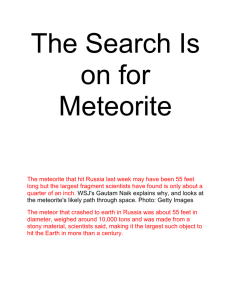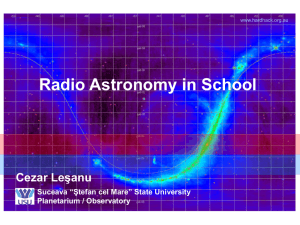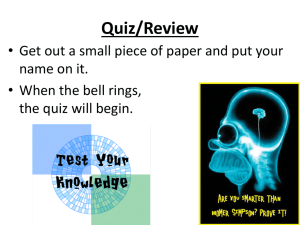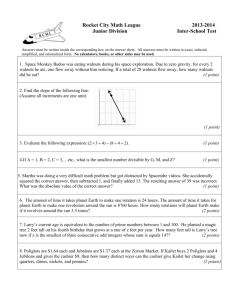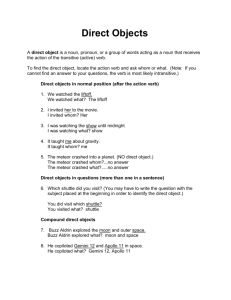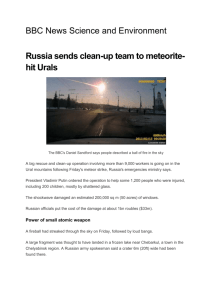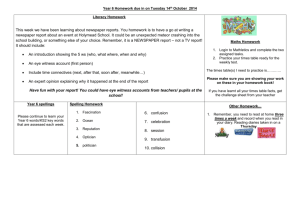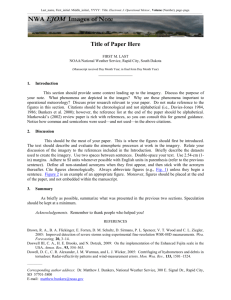File
advertisement
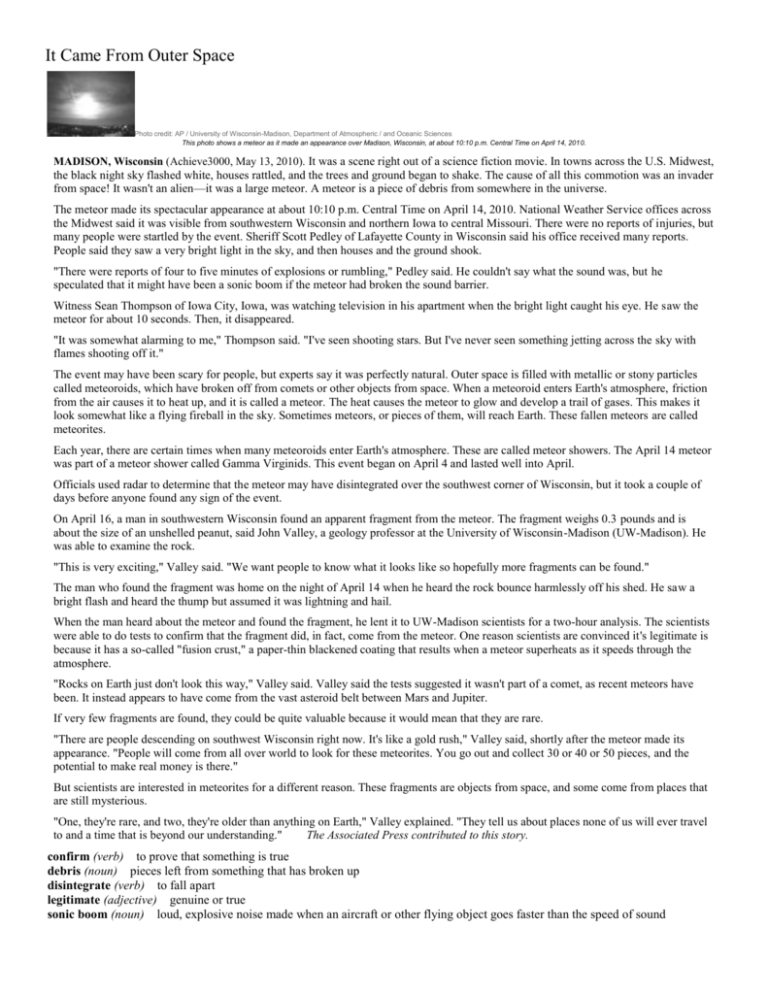
It Came From Outer Space Photo credit: AP / University of Wisconsin-Madison, Department of Atmospheric / and Oceanic Sciences This photo shows a meteor as it made an appearance over Madison, Wisconsin, at about 10:10 p.m. Central Time on April 14, 2010. MADISON, Wisconsin (Achieve3000, May 13, 2010). It was a scene right out of a science fiction movie. In towns across the U.S. Midwest, the black night sky flashed white, houses rattled, and the trees and ground began to shake. The cause of all this commotion was an invader from space! It wasn't an alien—it was a large meteor. A meteor is a piece of debris from somewhere in the universe. The meteor made its spectacular appearance at about 10:10 p.m. Central Time on April 14, 2010. National Weather Service offices across the Midwest said it was visible from southwestern Wisconsin and northern Iowa to central Missouri. There were no reports of injuries, but many people were startled by the event. Sheriff Scott Pedley of Lafayette County in Wisconsin said his office received many reports. People said they saw a very bright light in the sky, and then houses and the ground shook. "There were reports of four to five minutes of explosions or rumbling," Pedley said. He couldn't say what the sound was, but he speculated that it might have been a sonic boom if the meteor had broken the sound barrier. Witness Sean Thompson of Iowa City, Iowa, was watching television in his apartment when the bright light caught his eye. He saw the meteor for about 10 seconds. Then, it disappeared. "It was somewhat alarming to me," Thompson said. "I've seen shooting stars. But I've never seen something jetting across the sky with flames shooting off it." The event may have been scary for people, but experts say it was perfectly natural. Outer space is filled with metallic or stony particles called meteoroids, which have broken off from comets or other objects from space. When a meteoroid enters Earth's atmosphere, friction from the air causes it to heat up, and it is called a meteor. The heat causes the meteor to glow and develop a trail of gases. This makes it look somewhat like a flying fireball in the sky. Sometimes meteors, or pieces of them, will reach Earth. These fallen meteors are called meteorites. Each year, there are certain times when many meteoroids enter Earth's atmosphere. These are called meteor showers. The April 14 meteor was part of a meteor shower called Gamma Virginids. This event began on April 4 and lasted well into April. Officials used radar to determine that the meteor may have disintegrated over the southwest corner of Wisconsin, but it took a couple of days before anyone found any sign of the event. On April 16, a man in southwestern Wisconsin found an apparent fragment from the meteor. The fragment weighs 0.3 pounds and is about the size of an unshelled peanut, said John Valley, a geology professor at the University of Wisconsin-Madison (UW-Madison). He was able to examine the rock. "This is very exciting," Valley said. "We want people to know what it looks like so hopefully more fragments can be found." The man who found the fragment was home on the night of April 14 when he heard the rock bounce harmlessly off his shed. He saw a bright flash and heard the thump but assumed it was lightning and hail. When the man heard about the meteor and found the fragment, he lent it to UW-Madison scientists for a two-hour analysis. The scientists were able to do tests to confirm that the fragment did, in fact, come from the meteor. One reason scientists are convinced it's legitimate is because it has a so-called "fusion crust," a paper-thin blackened coating that results when a meteor superheats as it speeds through the atmosphere. "Rocks on Earth just don't look this way," Valley said. Valley said the tests suggested it wasn't part of a comet, as recent meteors have been. It instead appears to have come from the vast asteroid belt between Mars and Jupiter. If very few fragments are found, they could be quite valuable because it would mean that they are rare. "There are people descending on southwest Wisconsin right now. It's like a gold rush," Valley said, shortly after the meteor made its appearance. "People will come from all over world to look for these meteorites. You go out and collect 30 or 40 or 50 pieces, and the potential to make real money is there." But scientists are interested in meteorites for a different reason. These fragments are objects from space, and some come from places that are still mysterious. "One, they're rare, and two, they're older than anything on Earth," Valley explained. "They tell us about places none of us will ever travel to and a time that is beyond our understanding." The Associated Press contributed to this story. confirm (verb) to prove that something is true debris (noun) pieces left from something that has broken up disintegrate (verb) to fall apart legitimate (adjective) genuine or true sonic boom (noun) loud, explosive noise made when an aircraft or other flying object goes faster than the speed of sound +1 by James Luke Worrad author bio The man from NASA arrived the next morning. Walter Igwe met him at the crash site. "The agency would like to thank you, Mr. Igwe," the NASA man said, "for your quick response." It was plain he wasn't used to the savannah's heat. His temples ran slick with sweat. "It is nothing, sir," Walter said. "And my village offers the agency our condolences." "Appreciated, Mr. Igwe." He brushed an insect from his nose. "But ultimately it's just a setback." He laughed. "Albeit an expensive one." Walter hid his disgust. A man was dead. Their man. Was nothing sacred in America? "The main section," Walter said. "Your capsule fell over there." They made their way over scorched ground. Seeing the blackened capsule again, Walter recalled pulling the Astronaut out of it. It had taken much to haul the corpse from that impossibly cramped space. Walter had felt like a midwife, of sorts. The spacesuit had been perfectly white, its NASA symbol immaculate. Walter had half-believed--had prayed--the astronaut still lived. Yet the visor was smashed and behind it lay roast flesh and bare teeth. Nothing to be done. The NASA man spent the next two hours inspecting every piece of wreckage. He would look at some burnt device and mutter, "Write off," then move to the next. Walter said nothing, but his hands were fists. "You will come to the village now?" he asked the NASA man after he'd finished his inspection. "I'd love to, really I would," he replied, "but they expect me back at your capital." "But he's there, in my village. We have kept him in our refrigerator unit for you." The NASA man's brow crumpled. "I don't get you," he said. "Damn it, sir! Your man, your astronaut!" "But, Mr. Igwe…" he gestured at the wreckage. "This is a satellite. It's unmanned." The two men stared at one another. Save for the hum of insects, the world fell silent. The End This story was first published on Thursday, January 26th, 2012 Name: __________________________ Date: ___________________________ The article and story have _________________________________ The article and story have __________________________________ ____________________________________ __________________________________ in common. in common. Quote from article: Quote from story: Quote from article: Quote from story: What do the article and the short story have in common? You must incorporate the quotes you use above. Name: __________________________ Date: ___________________________ The article and story The article and story have __________________________________ __________________________________ in common. in common. Quote from article: Quote from story: Quote from article: Quote from story: What do the article and the short story have in common? You must incorporate the quotes you use above. The article and story both have unanswered questions. In the article scientists examine meteorites because they “….are objects from space, and some come from places that are still mysterious.” and “…. places none of us will ever travel to and a time that is beyond our understanding.” Meteorites create questions that beg to be answered as scientists seek to know more about space. In the story, the man from NASA seemed unaware of the dead astronaut. “Damn it, sir! ..your astronaut!” “But…This is a satellite. It’s unmanned.” Both the reader and the story’s characters are left confused wondering why there is a dead man if the craft was just a satellite. Both stories shared an element of mystery as answers are desired by scientists, readers, and story characters, but they are never given. Name: _________________________________________ Period: _____________ Date:________________ In the first two answers: highlight the answer green, the evidence yellow, and the explanation orange. The article and story both have unanswered questions. In the article scientists examine meteorites because they “….are objects from space, and some come from places that are still mysterious.” and “…. places none of us will ever travel to and a time that is beyond our understanding.” Meteorites create questions that beg to be answered as scientists seek to know more about space. In the story, the man from NASA seemed unaware of the dead astronaut. “Damn it, sir! ..your astronaut!” “But…This is a satellite. It’s unmanned.” Both the reader and the story’s characters are left confused wondering why there is a dead man if the craft was just a satellite. Both stories shared an element of mystery as answers are desired by scientists, readers, and story characters, but they are never given. The article and the story both involved something that came from space and ultimately landed on earth with signs of burning up along the way. The article explains that “When a meteoroid enters Earth's atmosphere, friction from the air causes it to heat up” and this , and it is called a meteor. The heat “…causes the meteor to glow and develop a trail of gases. This makes it look somewhat like a flying fireball in the sky.” The piece that was found had “’fusion crust,’ a paperthin blackened coating that results when a meteor superheats as it speeds through the atmosphere.” The story’s satellite must have ignited on its fall to earth as the astronaut “lay roast flesh and bare teeth” and the man from NASA “would look at some burnt device and mutter, ‘Write off,’” From the explanation in the article of what happens to a meteor, it would be logical to conclude that the satellite had ignited at some point on its fall as well. Both the meteor and the satellite burned up on their path to earth. In the following answers: highlight the answer green, the evidence yellow, and the explanation orange. Then according to the rubric determine the score and tell why. They’re similar because their both from space. In the article it said “All the cause or this commotions was an invader from outer space” In the story they pulled an astronaut. Astronauts come from space. They were both examined for 2 hours. NASA “inspected every piece of the wreckage” “John Valley a geology inspected it.” These stories are very similar. Score:________ Why:_______________________________________________________________________________ “It Came from Outer Space” and “+1” have something very similar in common. They both leave us with an unanswered question. In the article they tell us about places none of us will ever travel to and a time that is beyond our understanding. And in the story the two men stared at one another. Save for the hum of insects the world fell silent. Score:_______ Why:_________________________________________________________________________________ The article and story have some things in common but one of them is that they both were examined for two hours. From the article they said, “When the man heard about the meteor and found the fragment, scientists for a two-hour analysis.” And from the story they said, “The NASA man spent the next two hours inspecting every piece of wreckage.” Score:______ Why:______________________________________________________________________________ The article and the short story have in common that both came from outer space. In the article the reader said “…the black sky flashed white…the cause of all this commotion was an invader from space.” So that means that a meteor from outer space came. In the story the men said “The spacesuit had been perfectly white” an astronaut came from outer space. Score:____ Why:________________________________________________________________________________
